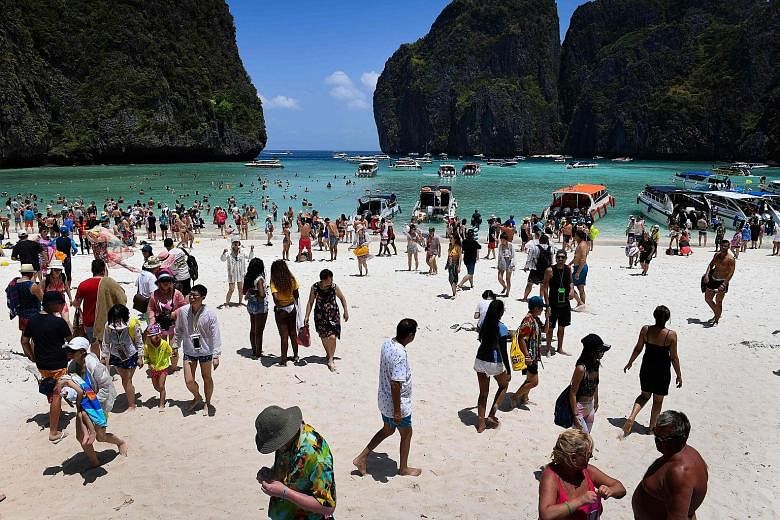KOH PHI PHI LEY (Thailand) • Hordes of tourists clamber across the white sand with selfie sticks as Thai park rangers wade into turquoise waters to direct boats charging into the cliff-ringed cove.
Made famous by the 2000 movie The Beach starring Leonardo DiCaprio, Maya Bay on the western Thai island of Koh Phi Phi Ley is now a case study in the ruinous costs of runaway tourism, swamped by up to 4,000 visitors daily.
"There are too many people here, it's bad," lamented Mr Saad Lazrak, a 61-year-old from Morocco, as crowds around him swallowed the stretch of sand encircled by an amphitheatre of limestone cliffs.
Across the region, South-east Asia's once-pristine beaches are reeling from decades of unchecked tourism as governments scramble to confront trash-filled waters and environmental degradation without puncturing a key economic driver.
Thailand's Maya Bay will be off limits for four months from June to September, officials announced last month, in a bid to save its ravaged coral reefs. In the Philippines, President Rodrigo Duterte this month ordered the Boracay beach resort to be closed to tourists for up to six months from April 26, describing it as a "cesspool" tainted by sewage dumped directly into the sea.
Indonesian officials, meanwhile, declared a "garbage emergency" last year swamping a 6km stretch of coast along the island of Bali.
The island's grim coastal pollution was highlighted last month by British diver Rich Horner's viral video of swimming through a sea of trash swirling offshore.
Conservationists and governments are worried about the health of coral reefs, which are in a dire state globally due to climate change and rising sea temperatures.
"Tourism has a series of detrimental effects on coral health," said Thailand-based marine biologist Eike Schoenig at the Centre for Oceanic Research and Education.
Countries in South-east Asia are looking to stem the threats without cutting off the cash flow of a regional tourism boom, led by China, the top source market for travellers to the region. Thailand received 35 million tourists last year, of whom nearly 10 million hailed from China, according to official data.
But what is good for business can be bad for beaches.
Still, governments are wary of curtailing an industry that creates jobs and buoys economies.
Spending on travel and tourism contributed nearly US$136 billion (S$178 billion) to the region's gross domestic product last year, a figure forecast to rise to US$144 billion this year, according to the World Travel and Tourism Council.
Experts are sceptical that short shutdowns will have lasting effects.
"The bottom line is that temporarily closing the beach is probably not the optimal solution to these problems. It takes only a day for a bunch of incompetent snorkellers to trash a small reef," said Mr Andrew Baird from the ARC Centre of Excellence for Coral Reef Studies in Australia.
AGENCE FRANCE-PRESSE

